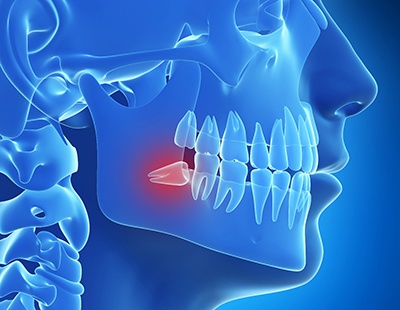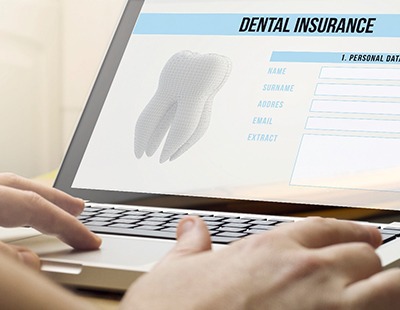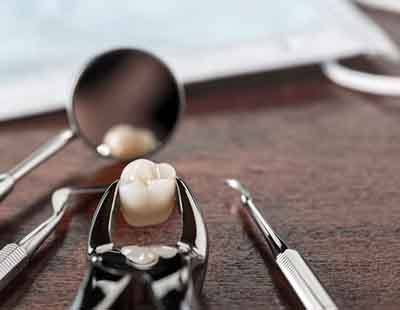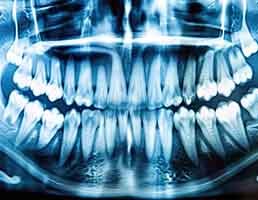Wisdom Tooth Extractions – Aspen Hill, MD
Careful and Precise Wisdom Tooth Removal
Are you struggling with chronic jaw pain? If you’re between the ages of 16 and 25, it may be stemming from your wisdom teeth. Don’t worry – our team at the Dental Center of Aspen Hill can help patients get out of pain by removing them before they have a chance to cause harm. Thanks to our dental experts, we can even perform the entire process of wisdom tooth extractions at our conveniently located office in Aspen Hill! If you want to schedule an appointment, get in touch with us. If you want to learn more, read on.
Why Choose the Dental Center of Aspen Hill for Wisdom Tooth Extractions?
- Skilled, Friendly, and Accommodating Dental Team
- We Make Your Comfort the #1 Priority
- Modern Dental Office Equipped with Advanced Technology
What are Wisdom Teeth?

Your third set of molars are referred to as “wisdom teeth.” Why? Because they typically don’t make an appearance until the late teens or early twenties. At your biannual checkups, our dedicated dentists will keep an eye on how they are developing. If they are growing in sideways, they are stuck beneath your gums, or there simply isn’t enough space in your mouth, we will remove them.
Why Do Wisdom Teeth Need to Be Removed?

Once wisdom teeth have begun to erupt, the patient will likely have all of their other permanent teeth. This means the wisdom teeth won’t have the room that they need, resulting in a variety of problems. For example, they can become stuck under gum tissue or adult teeth and cause pain, crowding, and even oral infections. At this point, removing them is essential in order to maintain your healthy, happy smile.
What to Expect from the Wisdom Teeth Procedure

When we’ve confirmed that your wisdom teeth need to come out, you can expect the procedure to look like the following:
- First, we’ll numb the treatment area with a local anesthetic to make you comfortable.
- After we’ve confirmed that the area is sufficiently numb, we’ll begin removing any gum and bone tissue that is still covering the tooth.
- Next, we’ll remove the tooth, typically in smaller pieces rather than all at once.
- Finally, we’ll stitch the treatment area closed.
Recovering from Wisdom Teeth Extraction

In the days following your appointment, you may experience some minor swelling and bleeding. To make the road to recovery as smooth and comfortable as possible, we recommend:
- Avoiding physical activities, like lifting weights
- Sticking to soft foods
- Taking OTC pain medication (as directed on the label)
- Keeping your mouth clean
- Not smoking, spitting, or drinking through a straw
By the end of the week, you should feel considerably better and be able to resume your regular diet and routine.
Understanding the Cost of Wisdom Tooth Extractions

The cost of wisdom tooth extractions varies from case to case. It depends on numerous factors, including the number of teeth we are removing, the condition of the teeth, and more. During your consultation, we will consider all relevant factors before we provide a price estimate. We will also make sure you understand your payment options, including dental insurance, financing, and our in-house membership plan. We want to make the monetary aspect of your care as low-stress as possible!
Wisdom Tooth Extractions FAQs
Why Do We Have Wisdom Teeth?
Of course, there’s no way to know for sure why people have wisdom teeth—however, there are theories. Early humans had larger jaws and a tougher diet, so it’s thought that these teeth would have been able to sprout without issue. However, this is not the case for modern humans, which is why they’re problematic for us.
Others believe that wisdom teeth are remnants from a period in history when people lost many of their teeth by early adulthood. Thus, having extra molars sprout at this age would be useful.
Does Everyone Have Wisdom Teeth?
Most people will see four wisdom teeth emerge at some point in their life, one on each side of both gum ridges. However, this isn’t the case for everyone. Some people are missing one wisdom tooth, two, three, or even all four! It’s believed that this is largely genetic, but no one knows for sure why this is the case.
That said, you can’t necessarily assume that you don’t have wisdom teeth because you can’t feel them. It’s possible for these teeth to become impacted or to never fully emerge. The only way to know for sure whether you’re lacking wisdom teeth is to take an x-ray.
Is Wisdom Tooth Removal Painful?
The first step of the wisdom tooth extraction process is to numb your mouth completely with a powerful local anesthetic. This ensures that the most you’ll feel during the removal is a slight pressure. This can be an odd feeling for sure, but it shouldn’t be painful in the slightest.
Of course, most patients are a fairly sore in the days following the procedure, but so long as you adhere to aftercare guidelines and take pain medicine as directed you should be able to make it through this period without much issue.
What’s the Best Age to Get Wisdom Teeth Removed?
There’s no set age where wisdom tooth removal is necessary, but generally speaking most people will get them taken out within a few years of them emerging. Typically, this happens sometime in early adulthood.
It’s possible for people to wait until they’re older to have their teeth removed, but this makes the healing process more difficult. The roots of your wisdom teeth will get longer as you age, and therefore become harder to remove.
All this is to say that you should probably act fairly quickly once we tell you that your wisdom teeth need to be removed—the longer you wait, the harder it’ll be.
I Need a Checkup & Cleaning I Have a Cavity or Broken Tooth I am Missing One or More Teeth I am Interested in Improving My Smile I am Looking for a Dentist for My Child I Want a Straighter Smile I am Worried About Gum Disease I am in Pain or Had an Accident I Want to Learn More About Sleep Apnea View Our Services





